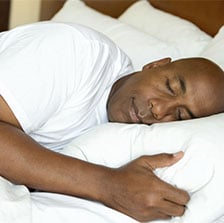Sleep Medicine
Our Sleep Medicine team uses advanced technology to diagnose and treat sleep disorders at a variety of locations throughout the community.

Our Team
Getting a good night’s sleep is important for so many reasons, not just because it affects how you feel in the morning. Your sleep health affects your total health. Sleep problems impact your heart health, metabolism, brain function and endocrine system. Now more than ever, it’s important to do all that you can to remain healthy.
MetroHealth’s Center for Sleep Medicine has facilities accredited by the American Academy of Sleep Medicine, and includes accredited locations at our main campus, and our hotel sites located in Beachwood and Independence, as well as a hotel site in Middleburg Heights that is seeking accreditation. Our team is involved in education and research that benefits people around the world.
We conduct sleep studies for kids and adults at several locations. Please ask about your options when scheduling your appointment.
Sleep Conditions We Treat
- Sleep Apnea: People with this sleep disorder experience unusual breathing patterns while they sleep.
- Insomnia: Difficulty falling asleep, staying asleep or waking too early characterizes this condition.
- Excessive Sleepiness (such as Narcolepsy): People with this disorder have trouble staying awake, and in severe cases, they may suddenly fall asleep during the day.
- Parasomnias: Involuntary, abnormal behaviors during sleep, like sleepwalking, are part of these sleep disorders.
- Sleep-related Movement Disorders (such as Restless Legs Syndrome): People with these disorders may have unusual movements in and around sleep. In Restless Legs Syndrome, they experience unusual sensations in the legs, often while they're trying to relax or sleep.
- Circadian Rhythm Disorders (such as Shift Work Disorder): People with these disorders find their internal clocks not in tune with normal day-night rhythm. Unusual work schedules (shift work) may make it hard to sleep.
Personalized Treatment
Prior to your first visit, you will be given a sleep questionnaire to complete. Additional questionnaires and testing may be needed. Pinpointing the source of sleep problems can be complicated and often requires unique tests, including but not limited to a sleep study (polysomnogram or home sleep study).
If you provider orders a polysomnogram, we will ask you to come to one of our sleep laboratory locations. You sleep overnight in a private room while we record your nighttime sleep patterns. To do this, our technicians attach electrodes to your head and body to monitor brain waves, muscle movements, breathing, snoring, and heart rate. Soft belts around your chest and waist monitor breathing. A sensor attached to your finger keeps track of heart rate and blood oxygen levels.
For some individuals, a more limited sleep study that can be performed at home can be offered.
During the follow-up appointment, your sleep medicine provider will discuss any test findings and next steps. These could include a variety of treatment options, depending on your condition, ranging from counseling / improving your sleep hygiene, snoring remedies, medications, surgery or getting a continuous positive airway pressure (CPAP) machine.
If you are found to have breathing problems in sleep, you may be prescribed a CPAP device. A CPAP machine sends a steady flow of pressurized air to your airway, so your airway stays open and your body has enough oxygen while you're sleeping. Most CPAP machines are smaller than a shoebox, and most people use a mask that covers only the nose.
How MetroHealth Can Help Restore Healthy, Restful Sleep
MetroHealth's team of sleep specialists is made up of highly-skilled physicians and surgeons, dedicated nurses and support members who are focused on ensuring that you get a good night's rest.
We use advanced technology to diagnose and treat sleep disorders. A simple treatment can make a huge difference—often without medication. No matter what kind of sleep problems you're experiencing, you'll receive individualized, patient-centered care.
Our Sleep Disorders Team
MetroHealth's Sleep Medicine team consists of dedicated providers who are focused on ensuring that you get a good night's rest.
- Physicians (for evaluation and medical treatment)
- Physicians (surgical treatment)
- Dentists
- Nurses
- Advanced nurse practitioners
Our Providers
Related Locations
Brunswick Health Center
1299 Industrial Parkway, 2nd Floor
Brunswick
,
OH
44212
Cleveland Heights Medical Center
10 Severance Circle
Cleveland Heights
,
OH
44118
MetroHealth Main Campus Medical Center
2500 MetroHealth Drive
Cleveland
,
OH
44109
Middleburg Heights November Family Health Center
7800 Pearl Road
Middleburg Heights
,
OH
44130
West 150th Health and Surgery Center
4330 West 150th Street
Cleveland
,
OH
44135